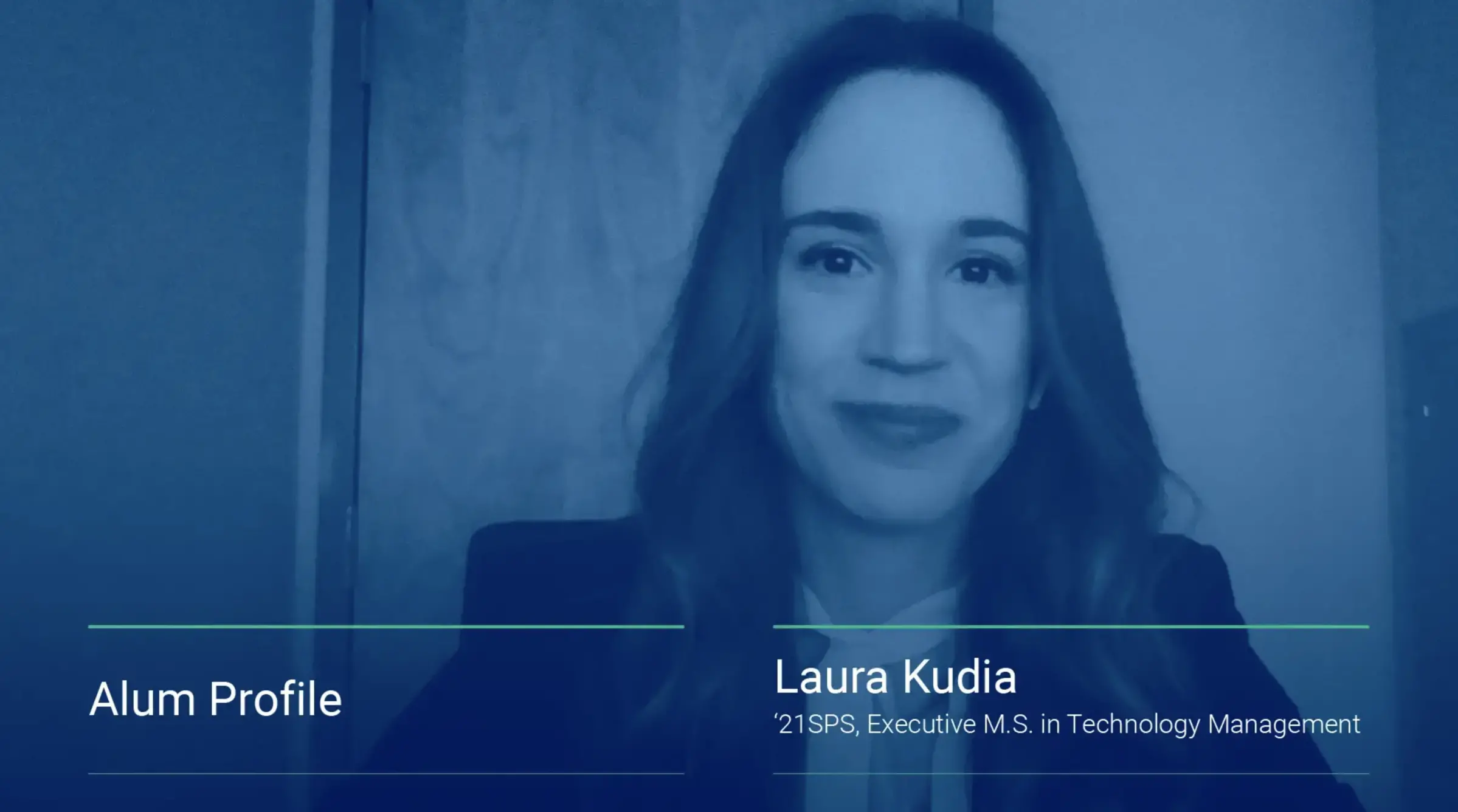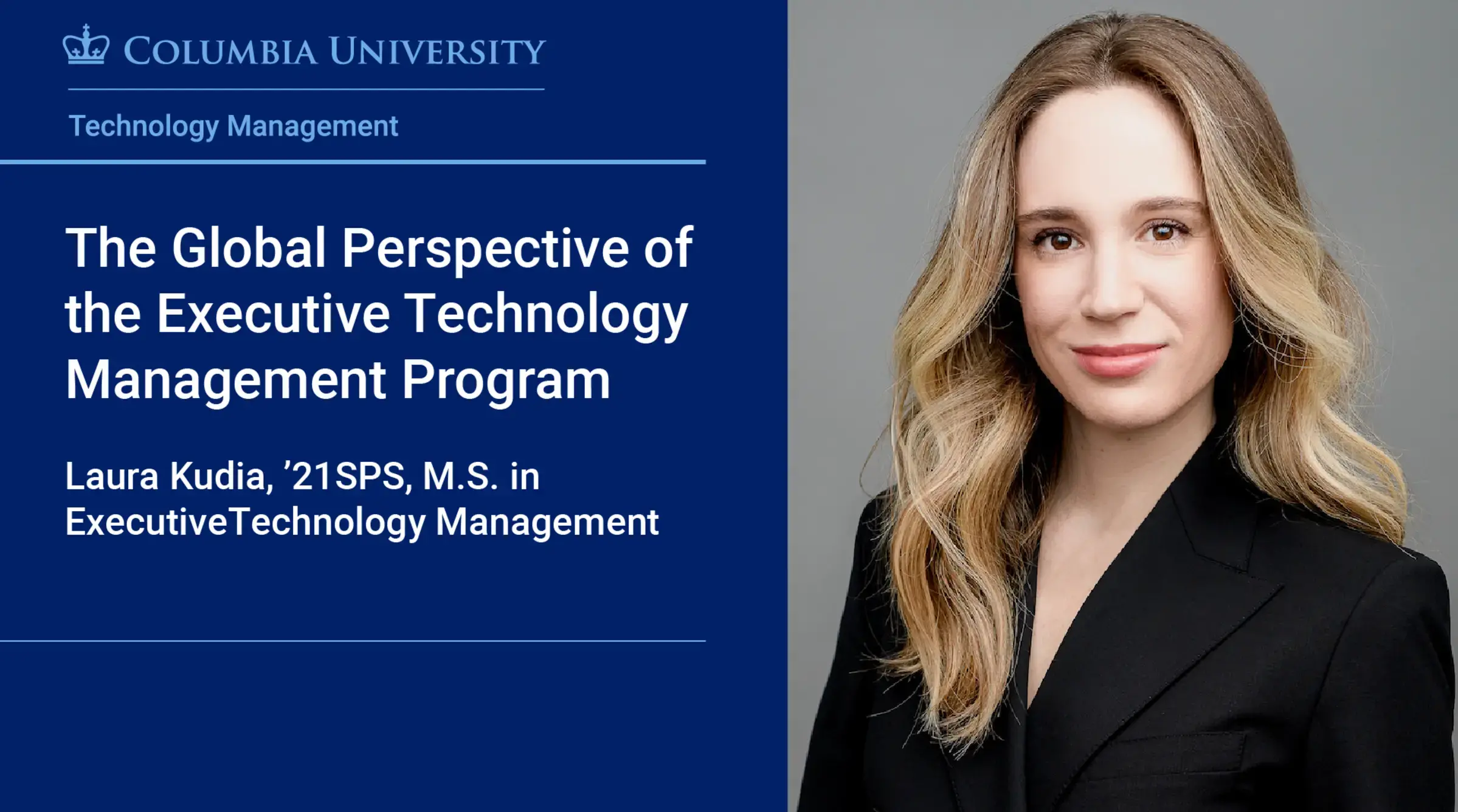Laura Kudia, '21SPS, Executive Technology Management, is the Chief of Staff, Corporate Systems and Technology Strategy at American Express. Kudia's role involves translating high-level ideas from the CIO into actionable steps for her direct reports. She discusses her experience at the Paris residency as well as working with her executive mentor, and her advice for fellow students in the program.
What led you to pursue the executive master’s degree in Technology Management?
I had been working for a decade, and I realized that in order to advance in my career, I needed to fill some critical skill gaps. Columbia’s program in Executive Technology Management provided the flexibility I needed to continue working, while learning those skills. On top of that, the global perspective of the program was really attractive to me.
Which courses, events or faculty members stood out in helping you to hone key skills?
I took two standout courses. The first was Accounting and Finance in Technology. We explored the central concepts surrounding the interplay between financial decisions in order to understand companies better and maximize resources. The second was Enterprise Information Security with Dr. Corey Hirsch. That class really laid the foundation for how to protect and enhance companies’ data security. There’s been an increase in interest in this topic since the pandemic. If there’s been one upside to COVID-19, it has been that women, particularly, have had a greater opportunity to lead. Dr. Hirsch showed us how the information security field is inherently interdisciplinary, but incredibly diverse.
Tell us about your experience at the residency in Paris.
Working with my fellow classmates in Paris was the highlight of the program. They were simply fantastic students. They came from various backgrounds: retail, media, technology, finance, and brought unique perspectives both in and outside of the classroom. My Paris cohort became an incredible support system to me. I’m sure I’ll have the friendships I built there for life.
Tell us about your career journey, and how you came to your leadership role at American Express.
My role before coming to the program was primarily technical, focused on an agile development journey, shipping to customers. When I started thinking about the next decade of my career, I realized that a well-rounded understanding of technology management would be pivotal in taking that next step. Tech management is a many-faceted field, involving delivery, people strategy, etc. The Executive program at Columbia created a solid grounding of these concepts that allows the student to learn to truly lead an organization in all aspects of the business.
What was your experience like working with your mentor?
What is incredibly unique about the program is that we are matched with an executive mentor. My mentor helped me think of the economic tradeoffs and the financial considerations in regards to my particular project. He helped me feel prepared for that moment when I had to stand up and pitch my business model. He practiced with me and prepared me to confidently stand up and clearly articulate not only the business value, but the economics behind my project. He challenged every aspect of the pitch, and asked me questions that I otherwise would not have thought about. I consider myself fortunate to have a mentor for life.
What kind of impact would you like to make in your career?
When I think of the impact I want to make, I look to some of the leaders of major tech companies. The best leaders are force multipliers—they make everyone around them excel in their own roles. In my career, as in so many, it comes down to people. Motivating and optimizing employees’ work, so that we all excel together.
What advice do you have for future students who want to succeed in leadership roles in the tech industry?
I have two pieces of advice I would give to future students. First, realize you have a responsibility to help the world, and it will only happen through smart, ethical decision-making. Technology in the modern age is truly a force to be reckoned with, and we need to make sure it’s a force of good. We’ve seen and experienced how technology shapes the world around us. We have an ethical responsibility to do the right thing for our users and our community, and to create responsible IT solutions.
Second, embrace agility. You never know when the management of the company will change, and it’s important to cultivate a mentor, especially as a woman in this industry. My mentor and I continue to stay in touch. He’s been a tremendous asset for my professional toolkit, and he helps me navigate any professional challenges that arise. When I was working on a major pitch for a new business model I had developed, my mentor asked questions I wouldn’t have thought of, and helped me to prepare. He practiced with me, and helped me gain the confidence I needed to present my project in the best possible light for the investors.
Learn more about Columbia’s Executive M.S. in Technology Management.




